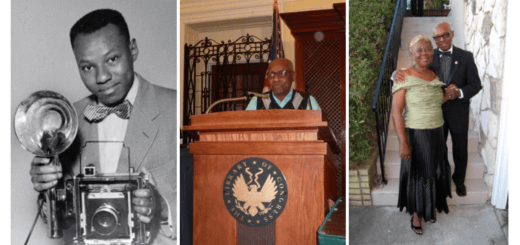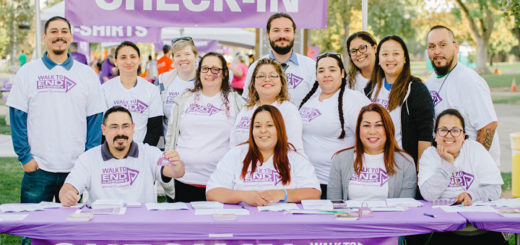Vacaville walker reflects on the importance of community
When her grandmother was diagnosed with Alzheimer’s disease, Lavona Hamilton was lucky to have the support of her family, friends and community. With the help of the Alzheimer’s Association®, she found a caregiver support group. Lavona supports the Alzheimer’s Association by participating in Walk to End Alzheimer’s®in memory of her grandmother.
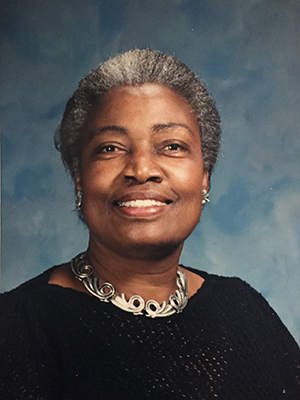
A generous woman
Theresa Thomas was the heart and joy of the family. Having suffered the loss of her mother when she was fourteen, Theresa was tasked with the role of raising her siblings. Despite this, she maintained a positive attitude. Even when things were bad, there was always tomorrow and an opportunity to count one’s blessings.
Living her life with the guiding principal: “The more you give, the more you receive,” Mrs. Thomas was incredibly generous and would give someone the clothes off her back. As a second-grade teacher, she showed her gift for working with children, supporting them with care and patience.
“My grandmother sacrificed a lot for this family,” shared Lavona. “I am who I am today because of her. I wouldn’t have had the opportunities I had if it were not for her. She has given this family a different trajectory because of her sacrifices.”
When Mrs. Thomas passed in 2016, many people saw the obituary and showed up at her funeral. “My grandmother made a big impression on everyone’s life,” said Lavona. “She was like a grandmother to people who weren’t close to their families. Those people wanted their grandkids to know who my grandmother was and what she did for them.”
Hiding the truth
When Lavona was attending college at UC Berkley in the mid 90’s, her grandmother would occasionally drive up from San Jose to visit her for lunch. What Lavona didn’t know was that Mrs. Thomas had started getting lost on the way home. “Six months went by before she mentioned it,” said Lavona. “She didn’t want to tell anyone that she’d gotten stuck on the freeway and was lost.”
Having lived in San Jose for more than 40 years, Mrs. Thomas figured out how to hide her confusion for a while. Eventually, she began to forget other things, like where her car was parked after a trip to the bank.
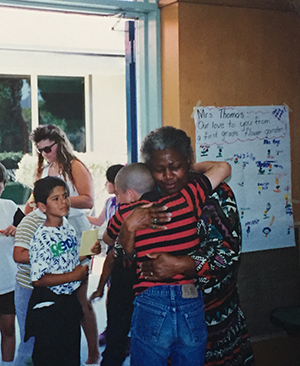
The move to Vacaville
In 2001, Mrs. Thomas went to a doctor, where she was diagnosed with Alzheimer’s disease. Mrs. Thomas and her husband continued to live in San Jose, but supporting her as a caregiver was taxing on her only child Bertha and Mr. Thomas.
Lavona and her mother, Bertha, began to realize how bad things had gotten. Soon they were making several visits a month to help Lavona’s grandfather take care of his wife. In 2003 Lavona’s grandparents made the move to Vacaville in order to be closer to Lavona’s mom. “It was a difficult change,” said Lavona. “We tried to make my grandmother feel calm, but that first year was difficult.”
Advocating for her grandmother
When Mr. Thomas died in 2012, Mrs. Thomas moved into a memory care facility nearby. Lavona and her mother visited daily to make sure she was well cared for. “I know because of heath disparities, sometimes Black families don’t receive the proper information or care,” said Lavona. “We’re a tight-knit family and my mother and I became my grandmother’s advocates. The staff knew that one of us would be coming by at some point during the day.”
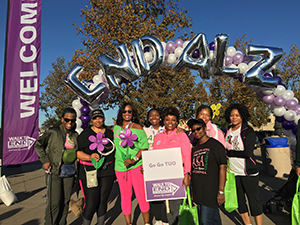
Support from Alpha Kappa Alpha Sorority Inc.
Older African Americans are about twice as likely to have Alzheimer’s or other dementia than Whites. They’re less likely to receive a diagnosis and if they do, it is more likely to be in the later stages. Currently, there are over two million African American caregivers who each provide an average of 22 hours of care per week.
It’s because of statistics like these that in 2018 Lavona’s sorority, Alpha Kappa Alpha (AKA), chose the Alzheimer’s Association as one of their national community service programs. “Our corporate office chooses the organizations we’re going to support,” said Lavona, who, in 2018, was the local chapter’s president.
“Alpha Kappa Alpha Sorority Inc., Tau Upsilon Omega (TUO) Chapter develops community service aid programs to address concerns and needs in the community. We met monthly and fundraise for the Alzheimer’s Association.”
Since Lavona already had a connection to the disease she was excited to work with the Alzheimer’s Association through her sorority. “We have a lot of people affected by the disease within our own group,” said Lavona.
“We know in general that African Americans have a much higher rate of getting Alzheimer’s. We set a fundraising goal that year and we exceeded it.” In 2018 the local Alpha Kappa Alpha Sorority Inc., TUO chapter raised $4,900 for the Solano County Walk to End Alzheimer’s.
Support group benefits
Lavona believes that there are many more people in her community who could benefit from support groups. “You’ll be in a conversation with someone and they’ll say something like, “˜oh she’s just having a little memory loss,'” said Lavona. “In the Black community they don’t open up about these things.”
The support received from the Alzheimer’s Association became an invaluable resource for them. They felt they were better able to provide for Mrs. Thomas because they knew what to look for and which questions to ask. They learned this information from others, who had already been through this process, and the volunteer facilitator.
“It was great to have someone to bounce ideas off of and come up with pros and cons for a situation,” said Lavona. “The people in the group have a good understanding of what you’re looking for.”
Connect with the Alzheimer’s Association
When your loved one is first diagnosed with Alzheimer’s disease, it may seem overwhelming. However, Lavona encourages others to reach out to the Alzheimer’s Association and learn more about the disease. “Every little bit helps,” said Lavona. “Utilize the support groups and listen to people’s stories. For me, it helped to learn more about the organization. From there, I realized how many more resources are out there for caregivers to get help.”
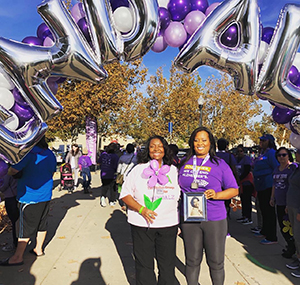
This year’s Walk to End Alzheimer’s
Lavona’s mother falls in a “˜high-risk’ category for COVID-19. Because they are following the CDC’s guidelines and don’t live in the same home, Lavona and her mother will not be able to walk together this year.
Like all walkers in 2020, we’re asking everyone to come together virtually on Walk day to watch the opening ceremony. Once the ceremony is over, walkers will take to the sidewalks, tracks and trails in their local community, wearing their purple, and carrying flags that are sent to all registered walkers.
“I’m still excited for the Walk,” said Lavona. “My friends and family know how awesome my grandmother was, and they always come out and support the family. Maybe this year we’ll have a Zoom party instead.”
Lavona encourages you to spread the word about Walk to End Alzheimer’s and help raise funds. “There is no cure and support for caregivers is needed,” said Lavona. “Find little ways to be impactful, like making masks and donating the proceeds. Now is the time to get on social media and start fundraising.”
“Get out there, wear your purple and have a conversation. Sometimes just giving your personal testimony about how it affected you and your family can help.”
We hope you will join us this Walk season to Walk with your family or household in your community. You can join Lavona’s team, Team Unity or start your own team for the Solano County Walk on October 10, We’re still coming together in 2020, even if it means trying something new. Learn about Walk to End Alzheimer’s in your area at alz.org/walk.
Learn more:





